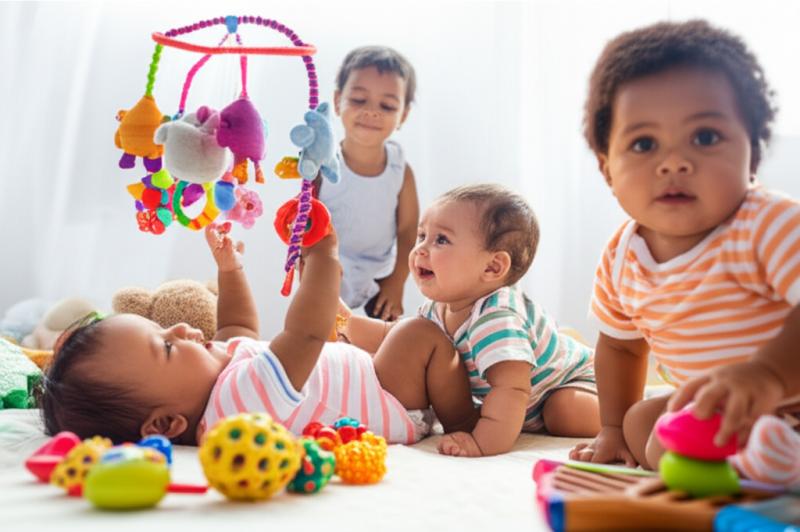Neste Artigo:
Why Are Baby Milestones So Stressful?
Social media paints a picture-perfect image of babies achieving milestones at lightning speed. One scroll through Instagram, and it seems like every infant is reciting Shakespeare while yours is still mastering the art of drooling. This constant comparison breeds anxiety and makes parents question whether their child is "falling behind."
The truth is, these online portrayals often represent outliers, not the norm. And focusing solely on ticking off milestones can blind you to the incredible, individual progress your baby is making.
What Does "Normal" Baby Development Really Look Like?
The reality is, the range of "normal" baby development is incredibly wide. Think of it like this:
- Some babies skip crawling altogether: They go straight to pulling themselves up and walking.
- Some babble early but take longer to sit up: Every baby prioritizes different skills.
- Some are focused on sensory exploration: They might be more interested in textures and sounds than physical movement.
All of these variations are perfectly normal and healthy. "On track" simply means progressing in a way that's right for your baby.
Beyond the Checklist: What Really Matters
Instead of obsessing over specific milestones, focus on these key indicators of healthy development:
- Purposeful interaction: Is your baby reaching for toys or objects with intention?
- Eye contact: Are they making and maintaining eye contact during playtime and interaction?
- Engagement: Do they show interest in their surroundings and react to stimuli like sounds and sights?
- Fine motor skills: Are they developing their ability to grasp and manipulate small objects?
- Sensory exploration: Are they exploring different textures, sounds, and sights?
These are all amazing signs of growth and development that can't always be captured on a standard milestone chart. Understanding how your baby's playtime impacts their development is also key. Read more about how to avoid Playtime Sabotage.
How Can I Ease My Baby Milestone Anxiety?
Here are some practical steps you can take to reduce your anxiety and embrace your baby's individual journey:
- Limit Social Media Comparison: Unfollow accounts that trigger feelings of inadequacy or anxiety. Focus on celebrating your own baby's progress.
- Trust Your Intuition: You know your baby best. If you have genuine concerns, consult with your pediatrician, but trust your parental instincts.
- Focus on Connection, Not Competition: Engage in activities that foster bonding and exploration, rather than trying to force specific milestones.
- Celebrate Small Victories: Acknowledge and celebrate every step forward, no matter how small.
- Remember the Big Picture: Focus on your baby's overall well-being, happiness, and connection with you. These are far more important than hitting arbitrary milestones. Recognize that The "Perfect" Mom Myth is just that: a myth.
When Should I Actually Worry?
While it's important to avoid unnecessary anxiety, there are certain red flags that warrant a conversation with your pediatrician. These include:
- Lack of eye contact: Consistent lack of eye contact can be a sign of developmental delays.
- No response to sounds: If your baby doesn't react to loud noises or familiar voices.
- Failure to reach for objects: If your baby isn't showing any interest in reaching for toys or objects by a certain age (consult with your pediatrician for age-appropriate expectations).
- Loss of previously acquired skills: This could indicate an underlying issue.
Remember, early intervention is key. If you have any concerns, don't hesitate to seek professional advice.
Frequently Asked Questions
Q: My baby isn't crawling yet. Should I be worried?
A: Not necessarily! Many babies skip crawling altogether and go straight to walking. Focus on their overall development and consult with your pediatrician if you have concerns, but don't panic.
Q: Is it okay if my baby isn't talking as much as other babies their age?
A: Babies develop language skills at different paces. Some are early talkers, while others focus on other areas of development first. Encourage communication through reading, singing, and talking to your baby.
Q: How can I support my baby's development without putting pressure on them?
A: Provide a stimulating and supportive environment where your baby can explore and learn at their own pace. Offer opportunities for play, interaction, and sensory exploration. Most importantly, focus on building a strong and loving connection with your baby. It's also important to be mindful of influences like Mommy Wine Culture.
Embrace the Journey, Not the Destination
Baby development milestones are simply guidelines, not rigid rules. Every baby is unique, and their journey will unfold in its own beautiful way. By releasing the pressure to conform to arbitrary timelines, you can rediscover the joy of watching your baby grow and develop at their own pace. Trust your intuition, celebrate their individual progress, and remember that the most important thing is to provide a loving and supportive environment where they can thrive.
So, take a deep breath, ditch the checklist, and embrace the magic of your baby's unique journey.

